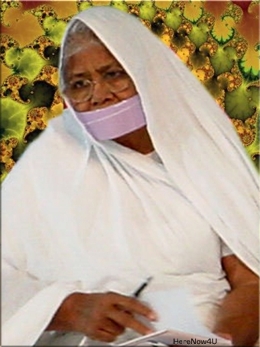Ahimsa in the Face of a Violent Situation
 |
By Sadhvi Pramukha Kanakprabha
Man is a being endowed with higher consciousness; together with the capacity to practice human values he is also able to remain vigilant towards them. In a time dominated by immorality, it may be difficult, though not impossible, to live a life based on values; distrust in human values is a problem in itself.
Tumult cannot overawe a man who lives in the midst of tumult, but its words can be rendered meaningless by him. The significance of a person's thinking and action lies in his ability to counter the impact of immorality even when he lives among corrupt and immoral people. A man who remains unaffected by the moments that shatter and diffuse his consciousness can enhance the grace of his personality. He who has an animated personality is never shattered; the circumstances that might cause his disintegration get shattered by themselves. The circumstances that tend to play with human consciousness manifest themselves in casteism, untouchability, price rise, poverty, luxurious lifestyle, affluence, indiscipline, craving for power, ambition, atrocities and lack of character.
Commitment to Ahimsa is a process to attain the state of fearlessness, even in regard to the own life, and to remain calm and unruffled even in the midst of provocative situations. Ahimsa always triumphs in such situations as is evidenced by Lord Mahavira's life, whether it was the bite of a venomous cobra or a devastating assault by an arrogant god or goddess. Lord Mahavira stood undaunted and faced the situation boldly with the result that the forces of violence were defeated.
Even in the twentieth century we have the peerless example of Mahatma Gandhi who used the weapon of Ahimsa even in face of a situation threatening his life. He emerged victorious, there was a change of heart even in the most wicked and violent people. Those who value the importance of Ahimsa never surrender to the forces of disruption and hatred, but challenge them and, if needed, lay down their lives for a bigger cause. When a person, aflame with anger and hatred, rushed towards a lover of Ahimsa with the object to kill him, it has happened that he suddenly felt helpless and bowed down.
These problems might have dominated in the past eras, but nowadays they have invaded the present in totality with a vengeance. In the case of total invasion, the solution of the problem also has to be total. The value of Ahimsa increases by itself, when violent circumstances become predominant. For the upward movement of human consciousness it is imperative to do away with any inhuman outlook.
 |
The reason for the malady gripping humanity is the loss of common social values evidenced in hoarding of goods and money, market exploitation together with exploitation of labour, cruelty towards life and surrounding, etc. In order to overcome this malady, Ahimsa, non-violence, and Aparigrah, non-possession, shall have to be given a prominent place. We will have to give shape to the vision of a healthy society under the backdrop of renunciation.
Before taking up any act one should look back and assess one’s capacity. Only then the outcome of the anticipated act can turn out to be good and desirable. After it has been started, distrust in the act is fatal. The swinging between trust and distrust gives way to frustrations. Social inhibitions are borne with utter helplessness and result in wretched feelings of feebleness.
Once there was a terrible epidemic in Baghdad. The Sheikh was told that it was caused by rats. His mind got infested with suspicion, wherever he found rats, he ordered them to be killed. Once he suspected rats to be in his house and ordered the house to be put on fire. There was a great chaos in the household. At that time a jester arrived. He said, "There are more rats in your head than in all rat-holes of Baghdad!" The Sheikh was very uneasy and started shaking his head as if trying to shake the rats off his head. He was not as much tormented by the real rats as he was by the imaginary rats in his mind.
Man is shaken more by imagined fear than by reality. Now it is expected that the state of disbelief will be removed and we will experience reality. We should be up on ethical and spiritual values and rejuvenate them. On the basis of values only a man can experience a state of sublimity and attain effulgence.
Human wisdom is timeless, universal and ubiquitous. The wider this light of wisdom, the better it is for human society. For this, it is necessary for us to remain committed to the implementation of immediate as well as long-term schemes and projects. Anuvrat can serve as a bridge for this task. The solution of the actual problems is contained in the Anuvrat code of conduct. Anuvrat is relevant today more than ever, because people of all sections of society are afflicted with horror. No horror or crisis can last long if efforts to nullify it go on relentlessly.
After completing its fifty-year long journey the Anuvrat Movement is on its onward march. Our efforts during these fifty years, explicitly and implicitly, have succeeded in taking the light of anuvrat to each and every individual in the society.
It depends on the ability and capacity of an individual how he or she looks at and makes use of the rays of light. Even these rays of light still do not have the capacity to influence an individual without preparedness for imbibing. If man takes to action, faces violent situations calmly and gives permanent place to Ahimsa, non-violence, and Aparigrah, non-possession, the needed values can be established now. Values can provide relief to mankind, suffering and groaning under the weight of evil forces. Ahimsa is more than non-violence. It is an inner awakening of joy not to be expressed in words. It gives rise to fearlessness in the heart of a person, radiating even in distant corners of the environment around us. Its significance will be revealed to those able to imbibe it in thought, word and deed.
-----------------------------------------------------
Article Source : Anuvibha Reporter ( Special Issue : December. 2000 )
Ahimsa, Peacemaking, Conflict Prevention and Management Proceedings and Presentations
Fourth International Conference on Peace and Nonviolent Action ( IV ICPNA )
New Delhi : Nov. 10-14, 1999
-----------------------------------------------------
Mail to : Ahimsa Foundation
www.jainsamaj.org
R301004